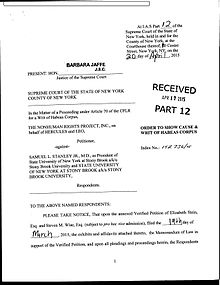The Madras High Court has granted a request made on behalf of a Minister’s wife for an expedited hearing of a habeas corpus case she filed accusing the Enforcement Directorate (ED) of not following due procedure in arresting her husband prematurely.

Habeas Corpus: A Personal Liberty Defender
- Definition: Habeas corpus is a legal remedy that allows persons to submit unlawful detentions or imprisonments to a court.
- Its purpose is to allow persons to petition the court to order the custodian, usually a jail official, to bring the imprisoned person before the court to determine the legality of the custody.
- Application in India: The Supreme Court and the High Courts in India have the authority to issue a writ of habeas corpus.
- Simple Fix: Habeas corpus is regarded as an efficient technique of addressing the loss of human liberty without legal justification as soon as possible.
Article 32: The Right to Recourse in the Courts
- Fundamental Right: Article 32 of the Indian Constitution affirms the right to constitutional remedies, allowing citizens to petition the Supreme Court to have their fundamental rights enforced.
- It empowers the Supreme Court to issue directions, orders, or writs to protect the rights guaranteed in Part III of the Constitution.
- Suspension: Except under certain constitutional limitations, such as during a state of emergency, the right given by Article 32 cannot be suspended.
- Article 32, according to Dr. B.R. Ambedkar, is the Constitution’s spirit and heart, underlining its important role in protecting rights.
Article 32 guarantees certain rights.
- Inclusion in Part III: In Part III of the Constitution, Article 32 is included with other fundamental rights such as the right to equality, freedom of speech and expression, life and personal liberty, and religious freedom.
- Individuals may approach the Supreme Court directly only when any of their fundamental rights are violated, according to Article 32.
Article 32- Writs
- Habeas Corpus Writs: Concerns personal liberty in circumstances of unjust imprisonment and wrongful arrest.
- Mandamus: Orders public officials, governments, and courts to carry out their statutory responsibilities.
- Quo Warranto: Requires a person to demonstrate the power they have in order to occupy a public position.
- Orders judicial or quasi-judicial authorities to halt proceedings that are beyond their jurisdiction.
- Certiorari: Allows judicial, quasi-judicial, or administrative bodies to re-examine orders issued by them.
Hierarchy of Remedy and Violations of Fundamental Rights
- Individuals in civil or criminal cases first approach trial courts, followed by appeals to the High Courts and the Supreme Court.
- Fundamental Rights Violation: Individuals may seek redress from the High Court under Article 226 or the Supreme Court immediately under Article 32 in circumstances of fundamental rights infringement.
Source: https://www.law.cornell.edu/wex/habeas_corpus
